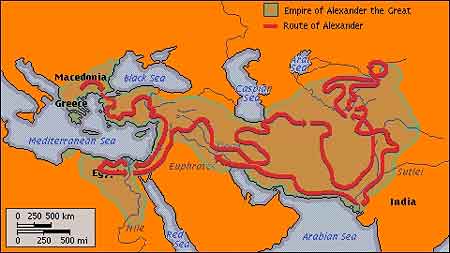1) Does Alexander deserve to be called “Great”?
In my opinion I think that Alexander did deserve his epithet, he deserves it for a number of reasons. Alexander
only at the age of twenty took rule over entirety of Macedon and the Corinthian
League after his father, king Philip, and led an army over 3,000 miles on foot.
During Alexander’s rule he never lost a fight though some argue he never had a
chance. He also introduced lots of strategies in war, some called Alexander a
military genius because of how good he was at commanding his army. Alexander
introduced a new phalanx with weapons that were far more advanced than his
enemies. (Konstam, Angus. Historical
Atlas of Ancient Greece. New York: Checkmark, 2003. Print.) When
Alexander completed his father’s goal, to invade Persia, he wasn’t finished
there. Alexander continued to trek across Asia destroying and also improving
things throughout his journey. (“History Study Center - Home Page." History Study Center - Home Page.
N.p., n.d. Web. 30 Sept. 2014.) After Alexander’s death in 323
B.C the Greek culture flourished throughout Asia where he had conquered. So in
some ways Alexander did good to help improve things.

2) What can one learn values of society based about the on their views
of greatness?
Based on how someone defines greatness can change
how they look at society. There are many great people doing good to help
improve the society we have today. People like doctors are constantly working
to keep our society alive. Doctors are great people because they work to save
lives of people who are sick. During Alexander’s rule the people needed a king
to take over the land captured, but Alexander continued to capture more
territory when he could have just stopped and returned to Macedon. ("History
Study Center - Home Page." History
Study Center - Home Page. N.p., n.d. Web. 30 Sept. 2014.) The people who saw Alexander as great for all of the killing he did
would prove that the Macedonian society was violent. A society has to have people who trust each
other to do the right thing.
3) Do time and distance impact someone’s popular perception?
Time and distance can have a very large impact on
someone’s popular perception. In Alexander’s day a person who lived and Macedon
would likely think differently of how we see him living in America today. Many
of us would see Alexander as a king who made the largest empire in the world
whereas someone living in Macedon or Asia might just see him as a ruthless
killer who wouldn’t stop conquering land for his empire. Time also changes how
we see someone. We can see the overall changes many years after his death. We
can see that Alexander also made Greek culture thrive throughout Asia. ("Science,
Civilization and Society." Science,
Civilization and Society. N.p., n.d. Web. 30 Sept. 2014.) Also over time the stories told about Alexander could have been biased
and blown out of proportion. Time and distance can really change how we see
people and their actions.
Works Cited
Bio.com. A&E Networks
Television, n.d. Web. 30 Sept. 2014.
Sienkewicz, Thomas J. Encyclopedia of the Ancient World.
Pasadena, CA: Salem, 2002. Print.
"Science, Civilization and Society." Science, Civilization and Society.
N.p., n.d. Web. 30 Sept. 2014.
"History Study Center - Home Page." History Study Center - Home Page.
N.p., n.d. Web. 30 Sept. 2014.
"Alexander the Great." Ushistory.org. Independence
Hall Association, n.d. Web. 29 Sept. 2014.
"Alexander the Great (Alexander of
Macedon) Biography." Alexander
the Great (Alexander of Macedon) Biography. N.p., n.d. Web. 29 Sept. 2014.
Konstam, Angus. Historical Atlas of Ancient Greece.
New York: Checkmark, 2003. Print.
I had the same ideas as you did on what can be determined about a society based on their views of greatness. I drew the same conclusion that the Macedonian society was violent. However, what would you say is another example of great people in our society other than doctors?
ReplyDelete@Sam many people are doing good for our community. People who do good like civil service people can be another good example for great people in our society.
ReplyDeleteHow did he improve things on his journey?
ReplyDeleteI like how you specifically put in your post how people say that Alexander did not have enough time to lose a battle and I completely agree with that statement. I agree with all of your points and I really like way you presented all of your information.
ReplyDeleteI liked your explanation of time and distance. You explained that over time stories are stretched and blown out of proportion to make things seem better or worse than they really are. I also like number 2 because you have the same idea as I had. Good job!
ReplyDeleteLater after his death we saw that Alexander made Greek culture flourish throughout the places he conquered @Tim.
ReplyDeleteVery nice examples in your first paragraph. Also, I like how you said his ideas could have been biased over time. Nice job!
ReplyDelete